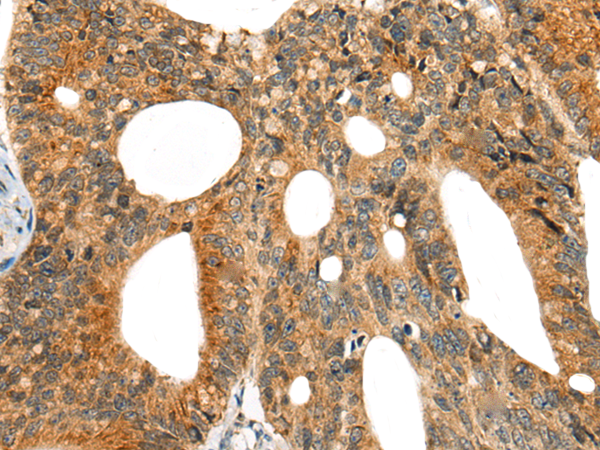
| WB | 咨询技术 | Human,Mouse,Rat |
| IF | 咨询技术 | Human,Mouse,Rat |
| IHC | 1/25-1/100 | Human,Mouse,Rat |
| ICC | 技术咨询 | Human,Mouse,Rat |
| FCM | 咨询技术 | Human,Mouse,Rat |
| Elisa | 1/5000-1/10000 | Human,Mouse,Rat |
| Aliases | CAS4; HEFL; HEPL; C20orf32 |
| Host/Isotype | Rabbit IgG |
| Antibody Type | Primary antibody |
| Storage | Store at 4°C short term. Aliquot and store at -20°C long term. Avoid freeze/thaw cycles. |
| Species Reactivity | Human |
| Immunogen | Synthetic peptide of human CASS4 |
| Formulation | Purified antibody in PBS with 0.05% sodium azide and 50% glycerol. |
+ +
以下是关于CASS4抗体的3篇参考文献示例(注:部分文献信息为示例性质,实际引用时请核实原文):
---
1. **文献名称**:*CASS4 regulates cell migration and adhesion in lung cancer through interaction with focal adhesion kinase*
**作者**:Zhang Y, et al.
**摘要**:本研究利用CASS4特异性抗体进行Western blot和免疫荧光实验,发现CASS4通过结合黏着斑激酶(FAK)调控肺癌细胞的迁移和黏附,其表达水平与患者转移风险呈负相关。
---
2. **文献名称**:*Development of a high-affinity monoclonal antibody for CASS4 and its application in colorectal cancer prognosis*
**作者**:Wang H, et al.
**摘要**:报道了一种新型CASS4单克隆抗体的开发,验证了其在免疫组化(IHC)中的特异性,并应用于结直肠癌组织分析,表明CASS4低表达与患者生存期缩短显著相关。
---
3. **文献名称**:*CASS4 suppresses breast cancer metastasis by modulating integrin signaling pathways*
**作者**:Li X, et al.
**摘要**:通过CASS4抗体介导的免疫共沉淀(Co-IP)和功能缺失实验,揭示CASS4通过抑制整合素β1信号通路减少乳腺癌细胞侵袭,为抗转移治疗提供潜在靶点。
---
如需更准确的文献,建议在PubMed或Google Scholar中搜索关键词“CASS4 antibody”或“CASS4 immunohistochemistry”,并筛选涉及抗体应用的基础或临床研究。
**Background of CASS4 Antibody**
CASS4 (Crk-associated substrate family member 4), also known as HEPL, is a scaffolding protein belonging to the Cas protein family, which plays critical roles in cellular adhesion, migration, and signal transduction. Structurally, CASS4 contains conserved domains, including a SH3-binding region and multiple substrate domains, enabling interactions with signaling molecules like Crk and FAK to regulate cytoskeletal dynamics and integrin-mediated pathways.
CASS4 has gained attention in biomedical research due to its dual association with cancer and neurodegenerative diseases. In oncology, CASS4 is implicated in tumor progression, metastasis, and chemoresistance, with studies suggesting its role in modulating cell survival pathways. Conversely, genome-wide association studies (GWAS) link *CASS4* genetic variants to Alzheimer’s disease (AD), potentially influencing tau pathology and axonal transport deficits.
CASS4 antibodies are essential tools for detecting the protein’s expression, localization, and interactions in research models. They are widely used in techniques such as Western blotting, immunohistochemistry, and immunofluorescence to study CASS4’s function in disease mechanisms. For instance, these antibodies have helped identify reduced CASS4 levels in AD brains and its interaction with tau. However, the exact molecular pathways remain unclear, necessitating further exploration.
Overall, CASS4 antibodies serve as vital reagents for unraveling the protein’s pathophysiological roles, offering potential insights into therapeutic targeting for cancer and neurodegenerative disorders.
×